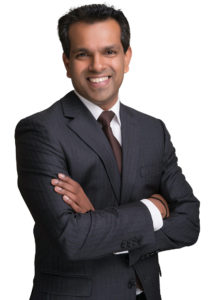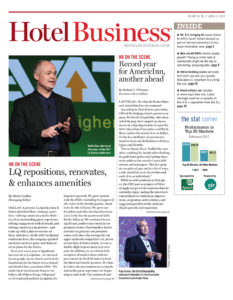 With more than a dozen years as SVP of acquisitions and development, Asia Pacific at the former Starwood Hotels & Resorts Worldwide, Rajit Sukumaran is now leveraging his skill set at IHG as chief development officer for Asia, Middle East and Africa (AMEA), a wide-ranging region that includes almost 40 countries where IHG has 280 open hotels with another 149 hotels in the pipeline. Brands in the area include InterContinental Hotels & Resorts, Crowne Plaza, Hotel Indigo, Holiday Inn, Holiday Inn Express and Staybridge Suites. IHG plans to introduce its EVEN Hotels brand to Australia and New Zealand in the near-term and to debut Kimpton Hotels & Restaurants to the region over time.
With more than a dozen years as SVP of acquisitions and development, Asia Pacific at the former Starwood Hotels & Resorts Worldwide, Rajit Sukumaran is now leveraging his skill set at IHG as chief development officer for Asia, Middle East and Africa (AMEA), a wide-ranging region that includes almost 40 countries where IHG has 280 open hotels with another 149 hotels in the pipeline. Brands in the area include InterContinental Hotels & Resorts, Crowne Plaza, Hotel Indigo, Holiday Inn, Holiday Inn Express and Staybridge Suites. IHG plans to introduce its EVEN Hotels brand to Australia and New Zealand in the near-term and to debut Kimpton Hotels & Restaurants to the region over time.
Prior to joining Starwood, Sukumaran worked in the corporate finance division of PwC Singapore, where he was involved with mergers, acquisitions and initial public offerings.
IHG has a global reach in terms of its hotel distribution. How is the company shaping its portfolio in AMEA? The increasing global demand from guests and owners for our portfolio of brands is extremely encouraging and that is demonstrated across the region by continuing to enter new markets. In 2016 we debuted the Hotel Indigo brand in Singapore and took Holiday Inn Express to Australia and Malaysia. More than a third of our InterContinental Hotels & Resorts globally are found in the AMEA region and there is still a strong opportunity to grow in the luxury space. Holiday Inn and Crowne Plaza both already have a wide and established footprint with substantial pipelines of hotels that will open in the next three to five years.
Now is the right time for us to accelerate our growth in the lifestyle segment as we have a trio of brands, EVEN Hotels, Hotel Indigo and Kimpton Hotels & Restaurants, in this space.
Where is IHG putting its focus in terms of growth in AMEA? We are actively looking for strategic partners to grow our footprint. We see opportunities across countries with strong domestic travel such as Australia, Japan and India, as well as international destinations encompassing both key cities and resort locations.
Is IHG being more opportunistic or more strategic in making these distribution decisions? We have a well-established and long-term strategy for high-quality sustainable growth. We continue to make sure we deliver on our strategy in a way that makes sense for different markets and geographies. This involves staying close to the trends shaping our industry and region, as well as focusing on high-quality growth that brings the right brands at the right time to the right locations with the right partners.
Given the political and financial stress that some AMEA countries are experiencing, what is giving IHG the confidence to push development in the region? As a global business with a footprint in nearly 100 countries, managing through change and uncertainty is something that we are very used to. Our success comes from having a clear, proven and focused strategy in place, which continues to deliver value in this environment. It is also a result of having a portfolio of preferred brands, strong long-term relationships with our owners and significant global scale.
Is there more of an effort to increase distribution of IHG’s lifestyle brands as opposed to legacy brands? There is a huge potential and opportunity in AMEA as more travelers are looking for unique experiences. Our newer brands provide great opportunities to grow our footprint by providing travelers with a different experience where we already have a strong presence. While we do see increasing demand for our lifestyle brands, our more-established brands continue to appeal to both existing and new ownership groups.
Are the brand products different in their design, amenities, etc., than their Western counterparts? Our brand promises are consistent across our portfolio, but the design and amenities can vary from one region to another. Where it makes sense, we localize the experience. A great example is our China Ready program to answer the needs of our Chinese guests. [We offer] Chinese-speaking staff at the front desk or via 24/7 phone support, acceptance of China UnionPay cards, a Chinese welcome pack, Chinese channels on in-room televisions, Chinese tea and a variety of Chinese food and beverage options at participating hotels. IHG also has invested heavily in equipping its worldwide hotel staff with Chinese etiquette, culture and hospitality training.
How is IHG looking to increase its presence in AMEA? The vast majority of our hotels in AMEA are operated under management agreements…but in some more-developed countries where there are increasing numbers of established operators, we are seeing a greater demand for franchise contracts. In these countries, we would be open to exploring franchise contracts with the right partners that are able to deliver the brand promise and guest experience expected across our portfolio. A good example of this would be our signing of the Master Franchise Agreement with the Pro-invest Group to roll out our EVEN Hotels brand across Australia and New Zealand. This is a follow up to a Master Franchise Agreement with them to roll out the Holiday Inn Express brand in Australia.
What’s the vision for the next three to five years? We see a strong runway for our brands in AMEA. There are opportunities ahead for our well-established brands, including InterContinental Hotels & Resorts where over 40% of the brand’s global pipeline is in AMEA. Holiday Inn, Holiday Inn Express and Crowne Plaza have a strong pipeline and will continue to grow their scale and move into new markets.
EVEN Hotels will debut in Australia and New Zealand—the first countries outside the U.S.—with 10 hotels in key cities. Hotel Indigo is already building its footprint across Southeast Asia with hotels in Bangkok, Singapore, and will open soon in Seminyak, Bali, the brand’s first resort location. It also has another 14 hotels in the pipeline in Australia, Thailand, the UAE and beyond. HB

